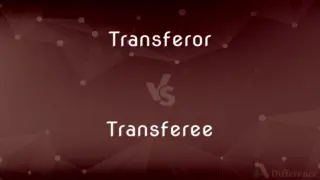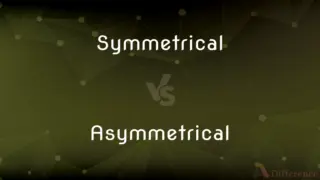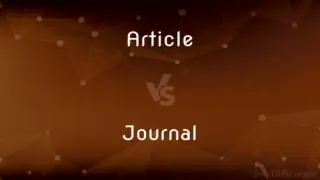Tone vs. Intonation — What's the Difference?
By Tayyaba Rehman — Updated on November 6, 2023
Tone is the general character or attitude of a place, piece of writing, situation, etc. Intonation is the rise and fall of the voice in speaking.

Difference Between Tone and Intonation
Table of Contents
ADVERTISEMENT
Key Differences
Tone in linguistics often refers to the writer's or speaker's attitude toward the subject or audience. It's conveyed through the choice of words and style of expression. Intonation, on the other hand, is a feature of pronunciation and involves the variation of pitch while speaking, which can affect the meaning of words. Both tone and intonation are essential in communication but serve different purposes.
While tone can set the mood for a conversation or written text, intonation can change the function of a sentence. For instance, a sentence said with a rising intonation can turn a statement into a question. Tone can be described as formal, sarcastic, solemn, etc., whereas intonation is described in terms of the patterns of pitch, such as rising, falling, or flat.
Tone can remain consistent throughout a piece of writing or a part of a conversation, setting the overall mood or attitude. Intonation will vary within the same conversation as the speaker emphasizes different points, asks questions, or expresses different emotions. While tone is about expression at a macro level, intonation operates at a micro level, affecting the meaning of phrases and sentences as they are spoken.
In written communication, tone is inferred from word choice, sentence structure, and punctuation. Intonation is not a feature of written language but is a critical part of spoken language. Intonation helps convey subtleties in spoken communication, such as sarcasm, that might only be indicated in writing through the use of tone-establishing words.
A speaker uses intonation to convey meaning beyond the literal words spoken, such as to indicate a question, to show emotion, or to emphasize a point. Tone, while related to emotion and attitude, is less about the mechanics of speech and more about the choice of language. Both tone and intonation, however, are key to interpreting meaning correctly in both spoken and written language.
ADVERTISEMENT
Comparison Chart
Definition
Attitude or character of speech or writing.
Pattern of pitch changes in speech.
Communication Aspect
Conveys writer's or speaker's attitude.
Conveys emotions, questions, and emphasis in speech.
Expression
Through word choice and style.
Through pitch variation.
Use in Language
Present in both spoken and written language.
Exclusive to spoken language.
Impact on Meaning
Sets mood or overall sentiment.
Alters meaning and function of sentences.
Compare with Definitions
Tone
The attitude or character of a spoken or written text.
Her tone was so commanding that everyone listened immediately.
Intonation
The rise and fall of the voice in speaking.
Her intonation suggested that she was asking a question rather than making a statement.
Tone
The quality or feeling in spoken expression or writing.
The letter's formal tone conveyed the seriousness of the issue.
Intonation
The pattern of pitch changes in speech, affecting meaning.
The child's intonation on the last word turned the sentence into a plea.
Tone
The distinctive quality or pitch of a voice.
The therapist's calm tone helped soothe the anxious patient.
Intonation
The way in which the voice moves between high and low pitches.
The teacher's intonation kept the students interested throughout the lecture.
Tone
A musical or vocal sound with reference to its pitch, quality, and strength
They were speaking in hushed tones
The piano tone appears lacking in warmth
Intonation
The act of intoning or chanting.
Tone
The general character or attitude of a place, piece of writing, situation, etc.
There was a general tone of ill-concealed glee in the reporting
My friend and I lowered the tone with our oafish ways
Intonation
An intoned utterance.
Tone
A basic interval in classical Western music, equal to two semitones and separating, for example, the first and second notes of an ordinary scale (such as C and D, or E and F sharp); a major second
The B flat clarinet's part is written one tone higher than the pitch required
Intonation
A manner of producing or uttering tones, especially with regard to accuracy of pitch.
Tone
The particular quality of brightness, deepness, or hue of a shade of a colour
An attractive colour which is even in tone and texture
Stained glass in vivid tones of red and blue
Intonation
(Linguistics) The use of changing pitch to convey syntactic information
A questioning intonation.
Tone
(in some languages, such as Chinese) a particular pitch pattern on a syllable used to make semantic distinctions.
Intonation
A use of pitch characteristic of a speaker or dialect
"He could hear authority, the old parish intonation coming back into his voice" (Graham Greene).
Tone
The normal level of firmness or slight contraction in a resting muscle
A reduction of muscle tone
A certain amount of daily exercise is essential to maintain proper body tone and function
Intonation
(Music) The opening phrase of a plainsong composition sung as a solo part.
Tone
Give greater strength or firmness to (the body or a muscle)
Exercise tones up the muscles
Intonation
(linguistics) The rise and fall of the voice in speaking.
Tone
Harmonize with (something) in terms of colour
The rich orange colour of the wood tones beautifully with the yellow roses
Intonation
Emotive stress used to increase the power of delivery in speech.
Tone
Give (a monochrome picture) an altered colour in finishing by means of a chemical solution
It's a good idea to sepia tone the whole print first
Intonation
A sound made by, or resembling that made by, a musical instrument.
Tone
A sound of distinct pitch, quality, and duration; a note.
Intonation
Singing or playing in good tune or otherwise.
Her intonation was false.
Tone
The interval of a major second in the diatonic scale; a whole step.
Intonation
Reciting in a musical prolonged tone; intonating or singing of the opening phrase of a plain-chant, psalm, or canticle by a single voice, as of a priest.
Tone
A recitational melody in a Gregorian chant.
Intonation
A thundering; thunder.
Tone
The quality or character of sound.
Intonation
The act of sounding the tones of the musical scale.
Tone
The characteristic quality or timbre of a particular instrument or voice.
Intonation
The manner of speaking, especially the placement of emphasis, the cadence, and the rise and fall of the pitch of the voice while speaking.
Tone
The pitch of a word used to determine its meaning or to distinguish differences in meaning.
Intonation
Rise and fall of the voice pitch
Tone
The particular or relative pitch of a word, phrase, or sentence.
Intonation
Singing by a soloist of the opening piece of plainsong
Tone
Manner of expression in speech or writing
Took an angry tone with the reporters.
Intonation
The act of singing in a monotonous tone
Tone
A general quality, effect, or atmosphere
A room with an elegant tone.
Intonation
The production of musical tones (by voice or instrument); especially the exactitude of the pitch relations
Tone
A color or shade of color
Light tones of blue.
Intonation
Variation in spoken pitch to convey different meanings or emotions.
His intonation became tense and high-pitched as the argument heated up.
Tone
Quality of color
The green wallpaper had a particularly somber tone.
Intonation
The musical quality of the voice while speaking.
The actor's perfect intonation captivated the audience.
Tone
The general effect in painting of light, color, and shade.
Tone
The normal state of elastic tension or partial contraction in resting muscles.
Tone
Normal firmness of a tissue or an organ.
Tone
To give a particular tone or inflection to.
Tone
To soften or change the color of (a painting or photographic negative, for example).
Tone
To sound monotonously; intone.
Tone
To make firmer or stronger. Often used with up
Exercises that tone up the body.
Tone
To assume a particular color quality.
Tone
To harmonize in color.
Tone
(music) A specific pitch.
Tone
(music) (in the diatonic scale) An interval of a major second.
Tone
(music) (in a Gregorian chant) A recitational melody.
Tone
The character of a sound, especially the timbre of an instrument or voice.
Tone
(linguistics) The pitch of a word that distinguishes a difference in meaning, for example in Chinese.
Tone
(dated) A whining style of speaking; a kind of mournful or artificial strain of voice; an affected speaking with a measured rhythm and a regular rise and fall of the voice.
Children often read with a tone.
Tone
(literature) The manner in which speech or writing is expressed.
Tone
(obsolete) State of mind; temper; mood.
Tone
The shade or quality of a colour.
Tone
The favourable effect of a picture produced by the combination of light and shade, or of colours.
This picture has tone.
Tone
The definition and firmness of a muscle or organ; see also: tonus.
Tone
(biology) The state of a living body or of any of its organs or parts in which the functions are healthy and performed with due vigor.
Tone
(biology) Normal tension or responsiveness to stimuli.
Tone
A gun
Tone
(figuratively)
Tone
The general character, atmosphere, mood, or vibe (of a situation, place, etc.).
Her rousing speech gave an upbeat tone to the rest of the evening.
Tone
(Chiefly in the form lower/raise the tone of something) The quality of being respectable or admirable.
Tone
(transitive) to give a particular tone to
Tone
(transitive) to change the colour of
Tone
(transitive) to make (something) firmer
Tone
(transitive) to utter with an affected tone.
Tone
The one (of two)
Tone
Sound, or the character of a sound, or a sound considered as of this or that character; as, a low, high, loud, grave, acute, sweet, or harsh tone.
[Harmony divine] smooths her charming tones.
Tones that with seraph hymns might blend.
Tone
Accent, or inflection or modulation of the voice, as adapted to express emotion or passion.
Eager his tone, and ardent were his eyes.
Tone
A whining style of speaking; a kind of mournful or artificial strain of voice; an affected speaking with a measured rhythm ahd a regular rise and fall of the voice; as, children often read with a tone.
Tone
A sound considered as to pitch; as, the seven tones of the octave; she has good high tones.
Tone
That state of a body, or of any of its organs or parts, in which the animal functions are healthy and performed with due vigor.
Tone
Tonicity; as, arterial tone.
Tone
State of mind; temper; mood.
The strange situation I am in and the melancholy state of public affairs, . . . drag the mind down . . . from a philosophical tone or temper, to the drudgery of private and public business.
Their tone was dissatisfied, almost menacing.
Tone
Tenor; character; spirit; drift; as, the tone of his remarks was commendatory.
Tone
General or prevailing character or style, as of morals, manners, or sentiment, in reference to a scale of high and low; as, a low tone of morals; a tone of elevated sentiment; a courtly tone of manners.
Tone
The general effect of a picture produced by the combination of light and shade, together with color in the case of a painting; - commonly used in a favorable sense; as, this picture has tone.
Tone
Quality, with respect to attendant feeling; the more or less variable complex of emotion accompanying and characterizing a sensation or a conceptual state; as, feeling tone; color tone.
Tone
Color quality proper; - called also hue. Also, a gradation of color, either a hue, or a tint or shade.
She was dressed in a soft cloth of a gray tone.
Tone
The condition of normal balance of a healthy plant in its relations to light, heat, and moisture.
Tone
To utter with an affected tone.
Tone
To bring, as a print, to a certain required shade of color, as by chemical treatment.
Its thousand hues toned down harmoniusly.
The best method for the purpose in hand was to employ some one of a character and position suited to get possession of their confidence, and then use it to tone down their religious strictures.
Tone
The quality of a person's voice;
He began in a conversational tone
He spoke in a nervous tone of voice
Tone
(linguistics) a pitch or change in pitch of the voice that serves to distinguish words in tonal languages;
The Beijing dialect uses four tones
Tone
(music) the distinctive property of a complex sound (a voice or noise or musical sound);
The timbre of her soprano was rich and lovely
The muffled tones of the broken bell summoned them to meet
Tone
The general atmosphere of a place or situation and the effect that it has on people;
The feel of the city excited him
A clergyman improved the tone of the meeting
It had the smell of treason
Tone
A quality of a given color that differs slightly from a primary color;
After several trials he mixed the shade of pink that she wanted
Tone
A notation representing the pitch and duration of a musical sound;
The singer held the note too long
Tone
A steady sound without overtones;
They tested his hearing with pure tones of different frequencies
Tone
The elastic tension of living muscles, arteries, etc. that facilitate response to stimuli;
The doctor tested my tonicity
Tone
A musical interval of two semitones
Tone
The quality of something (an act or a piece of writing) that reveals the attitudes and presuppositions of the author;
The general tone of articles appearing in the newspapers is that the government should withdraw
From the tone of her behavior I gathered that I had outstayed my welcome
Tone
Utter monotonously and repetitively and rhythmically;
The students chanted the same slogan over and over again
Tone
Of one's speech, varying the pitch
Tone
Change the color or tone of;
Tone a negative
Tone
Change to a color image;
Tone a photographic image
Tone
Give a healthy elasticity to;
Let's tone our muscles
Tone
A particular style or approach in expression or content.
His humorous tone made the speech very engaging.
Tone
The general character of a place, situation, or piece of music.
The party had a festive tone with lively music and decorations.
Common Curiosities
Can intonation alone change the meaning of a sentence?
Absolutely, intonation can change statements to questions, indicate sarcasm, or show emphasis.
Can tone be neutral?
Yes, tone can be neutral, not indicating any particular attitude or emotion.
What does tone reveal in communication?
Tone reveals the speaker or writer's attitude and feelings about the subject.
How can I improve my intonation in a foreign language?
Listen to native speakers, mimic patterns, and practice with recordings to improve intonation.
Is intonation linked to punctuation in writing?
While not directly linked, punctuation can guide the reader on how to mentally 'intonate' phrases.
What role does tone play in poetry?
Tone in poetry helps convey the poet's mood and enhances the reader's emotional experience.
Does intonation affect the meaning of words in different languages similarly?
Intonation patterns can vary greatly across languages and can affect meanings differently.
Is tone important in written texts?
Yes, tone helps convey the author's attitude and influences how the text is received.
Can tone be misinterpreted in emails or messages?
Yes, without vocal cues, tone can often be misunderstood in written communication.
Do all languages use intonation?
Yes, all spoken languages use some form of intonation to convey meaning or emotion.
Is intonation important in singing?
Yes, intonation is crucial in singing for staying on pitch and expressing emotion.
Can intonation be taught?
Yes, with practice and listening exercises, intonation can be learned and improved.
Can a person's tone change during a conversation?
Yes, tone can change as a person's mood or attitude shifts.
How does tone differ in various forms of communication?
Tone may be more controlled in formal writing, while in conversation, it can be more relaxed or varied.
Does everyone have the same intonation patterns?
No, intonation can vary due to regional accents, individual speech habits, and language backgrounds.
Share Your Discovery

Previous Comparison
Transcription vs. Translation
Next Comparison
Memo vs. MemeAuthor Spotlight
Written by
Tayyaba RehmanTayyaba Rehman is a distinguished writer, currently serving as a primary contributor to askdifference.com. As a researcher in semantics and etymology, Tayyaba's passion for the complexity of languages and their distinctions has found a perfect home on the platform. Tayyaba delves into the intricacies of language, distinguishing between commonly confused words and phrases, thereby providing clarity for readers worldwide.















































